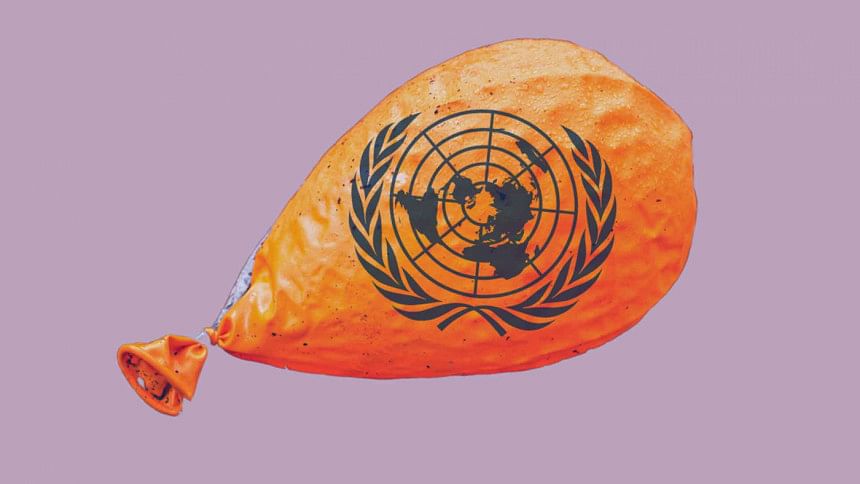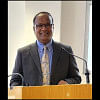Time for a fresh look at the UN

On April 24, US Secretary of State Antony Blinken and Defence Secretary Lloyd Austin visited Ukraine to discuss military aid with President Volodymyr Zelenskyy. So far, the US has committed USD 3.7 billion in civilian and military aid. On April 28, US President Joe Biden called on Congress to provide USD 33 billion (one-fifth of Ukraine's GDP) in additional security, economic and humanitarian assistance for Ukraine.
In Ukraine, eight million people (about one-sixth of the population) have been displaced, of whom 5.7 million are refugees. World food production is declining, fuel and food prices are increasing, and the inflationary pressure is high. The Russia-Ukraine war has put pressure on an already stressed supply chain. Both the World Bank and the International Monetary Fund (IMF) project lower global economic growth due to the war.
The superpower contest in Ukraine is overtly visible. Russian President Vladimir Putin is not backing down, and Secretary Blinken stated that the US wanted to see Russia "weakened" in this war. On May 3, Pope Francis said that the "barking of Nato at the door of Russia" might have led to the invasion of Ukraine, and that he did not know whether other countries should supply Ukraine with more arms. UN Secretary-General Antonio Guterres' plea to stop the war has not worked. The United Nations is helplessly doing the body count and taking care of the displaced population.
During the Korean War (1950-53) and the Cuban Missile Crisis (1962), we saw similar confrontations between superpowers. The UN could not stop the war in Vietnam. It could do little for the two Afghan wars; wars in Chechnya and Georgia; wars in the Gulf, Iraq, Syria, Libya, and Yemen; and most proxy wars. The superpowers contested or ignored these wars as per their national interest.
The League of Nations lasted only 13 years. Established in 1920, it lost its impetus when Japan and Germany, both superpowers at that time, left in 1933. Soviet Union's joining in 1934 could not save it. The US supported the establishment of the League, but never joined the organisation because of its isolationist policy.
Today's United Nations (UN) is an outcome of the conferences that took place among the Big Three (US, UK, and the Soviet Union) in Tehran (November 1943) and Yalta/Crimea (February 1945), and Potsdam (July 1945). The big powers established a system of global governance for peace and stability under the auspices of the UN and its umbrella organisations, including the IMF, the World Trade Organization (WTO), and the World Bank.
By and large, national interests of most member countries are served by the current UN system. Consistently, the UN has received favourable ratings in Pew Research polls. But at 77, the organisation remains a "superpower and friends" club. It has fallen behind in inclusivity, participation, and power-sharing. Its hegemonic arrangement with veto power is not compatible with the current economic and political realities.
Both Germany and Japan exert more economic power than France and the UK. Brazil, India, Indonesia, and South Africa can contest the superpowers in terms of GDP and population. Various proposals have been considered to change the veto power status, but so far, no agreement has been reached.
The IMF quota system and voting rights give more importance to the richer nations. The sanctions have brought the dollar-based monetary system to the limelight. Russia's insistence on selling gas/oil in ruble has challenged the dominance of the dollar. Increasingly, the Chinese renminbi is becoming a part of international reserves. The emerging trade and currency war is likely to complicate the situation.
About 7.9 billion people live on this planet with different economic, social, cultural, ethnolinguistic, and religious interests. Conflicts and wars are plausible. The moral purpose of the UN is defeated when the superpowers, as sponsors and guardians of the system, directly get involved in the conflicts.
It is time to take a fresh look at the UN. The organisation has its drawbacks, but it's not broken. The existing system of global governance needs reform. The economic, social, cultural, and military realities have changed significantly over the years. Empowering the UN is essential for lasting peace. The member states should be able to bring changes through honest deliberations.
European conflicts have given us two world wars. We cannot afford a third one. Demarketing the current war is urgently necessary for peace. During the Korean War and the Cuban Missile Crisis, the nonaligned nations played an active role. Peace efforts can come from them and various trade blocks. The Organisation of Islamic Conference (OIC) and religious organisations across the world should also come forward. We need reform for peace.
Dr Abu NM Waheeduzzaman is a professor of marketing and international business at Texas A&M University-Corpus Christi in the US.

 For all latest news, follow The Daily Star's Google News channel.
For all latest news, follow The Daily Star's Google News channel. 



Comments